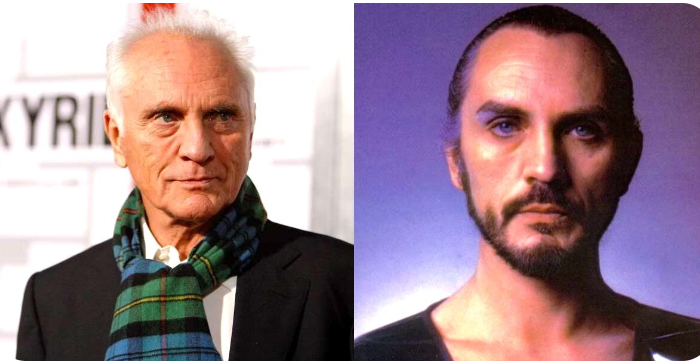
Hollywood Mourns the Death of Terence Stamp, The Iconic Actor Who Breathed Life into General Zod at 87

The world of cinema has been thrown into mourning following the passing of British screen legend Terence Stamp, who died at the age of 87. Best remembered by millions for his cold, commanding, and unforgettable performance as General Zod in the 1978 Superman and its sequel Superman II in 1980, Stamp’s death marks the end of an era in both British and international film. His family confirmed the heartbreaking news in a statement released to Reuters, describing him as a man who left behind not just an extraordinary career but also a lasting legacy that will continue to touch audiences for generations. In their words, “He leaves behind an extraordinary body of work, both as an actor and as a writer, that will continue to inspire people for years to come. We ask for privacy at this sad time.”
Born in London’s East End in 1938, at a time when the bombs of World War Two rained down on the city, Terence Henry Stamp came from humble beginnings as the son of a tugboat stoker. His early life was shaped by hardship, resilience, and an innate desire for something greater than what his surroundings offered. After leaving school, he initially found himself working in advertising, but fate had other plans. A scholarship to drama school would transform his destiny, catapulting him into a career that would span over six decades and cement his status as one of Britain’s most gifted exports to the world stage.
Stamp first rose to prominence in the 1960s during the vibrant cultural revolution of “Swinging London,” where music, art, and film blended to redefine global pop culture. He became one of the most recognizable faces of the British New Wave cinema, a movement that placed him at the forefront of change in the industry. His breakthrough role came in Peter Ustinov’s adaptation of Herman Melville’s Billy Budd (1962), where his mesmerizing performance earned him an Academy Award nomination. It was a remarkable achievement for a young actor still carving his place in the industry, but it also marked the beginning of a career defined by versatility and daring choices.
Unlike many of his contemporaries, Stamp never allowed himself to be typecast. Instead, he chose roles that stretched his artistry and challenged societal norms. From Pier Paolo Pasolini’s provocative Theorem (1968) to A Season in Hell (1971), Stamp quickly gained a reputation as an actor who could embody characters of immense complexity. Yet, it was his portrayal of General Zod in the Superman films that introduced him to a truly global audience. With piercing eyes, a chilling voice, and an aura of absolute authority, Stamp’s Zod became one of cinema’s greatest villains—so iconic that even decades later, fans and filmmakers reference his legendary line, “Kneel before Zod.”
But to reduce his career to that singular role would be to overlook his remarkable range. In 1994, he stunned audiences with his groundbreaking performance as Bernadette, a transgender woman in the cult classic The Adventures of Priscilla, Queen of the Desert. At a time when such roles were rarely treated with depth or dignity, Stamp delivered a tender, vulnerable, and deeply human portrayal that remains a milestone in queer cinema. It not only showcased his fearlessness as an actor but also demonstrated his ability to reinvent himself across generations of film.
Stamp’s life off-screen was just as fascinating. Known for his striking looks and magnetic presence, he was often described as one of the great heartthrobs of his generation. His personal life intertwined with the glamour of the 1960s, with well-documented romances and friendships that placed him at the center of London’s cultural renaissance. Yet behind the glitz, Stamp was also a thinker and a writer. He published memoirs and essays that revealed a man deeply interested in spirituality, philosophy, and self-discovery. His books, including Stamp Album and Rare Stamps, explored not just his career but his search for meaning beyond fame.
In later years, Stamp continued to work steadily, moving seamlessly between independent films, Hollywood blockbusters, and television. He appeared in films such as The Limey (1999), where his role as a vengeful ex-con became one of his most critically acclaimed later performances, and he also took on roles in projects like Star Wars: Episode I – The Phantom Menace (1999), further cementing his connection to pop culture phenomena. Directors and co-stars often spoke of his professionalism, charisma, and the gravitas he brought to every role, whether large or small.
The news of his death has prompted tributes from across the entertainment world. Actors, filmmakers, and fans have flooded social media with memories, praising him as a giant of cinema and a man whose work will never be forgotten. Many recalled his generosity on set, his commitment to the craft, and his ability to command attention with the smallest gesture. For younger generations who may not have known his early career, his roles in iconic franchises like Superman and Star Wars ensured that his legacy reached across eras, connecting grandparents, parents, and children through the shared magic of film.
What made Terence Stamp so unique was not just his talent but his refusal to be boxed in by expectations. He was as comfortable playing a Shakespearean hero as he was a comic book villain, as willing to explore the gritty streets of European arthouse cinema as he was to embrace the spectacle of Hollywood. His journey from the rubble of wartime London to international stardom stands as a testament to resilience, creativity, and the power of reinvention.
As fans around the world mourn, there is also a deep sense of gratitude for the vast contributions he made to cinema. For those who grew up watching him command the screen as General Zod, his presence was unforgettable. For those who admired his nuanced work in films like Theorem and Priscilla, he was proof of what fearless acting could achieve. And for those who read his writings, he was a man searching for understanding in a world that often misunderstood him.
Terence Stamp’s death is a profound loss, but his impact is eternal. His voice, his gaze, his performances—all will continue to live on in the countless films and writings he left behind. At 87, he departs this world not as a forgotten relic of the past but as a timeless figure whose artistry transcended generations. The world may have lost a legend, but the silver screen has gained a ghost whose presence will never fade. As fans revisit his films, from Billy Budd to Superman to The Limey, one truth remains clear: Terence Stamp was not just an actor; he was a force of nature. And though he is gone, the command of his most famous line will echo forever—“Kneel before Zod.”
---
Would you like me to also give you a shorter breaking-news style version (around 300–400 words) that you can post quickly before publishing the longer one?
Here’s a 1000-word news-style article for your blog based on the prompt:
---
Hollywood Mourns the Death of Terence Stamp, The Iconic Actor Who Breathed Life into General Zod at 87
The world of cinema has been thrown into mourning following the passing of British screen legend Terence Stamp, who died at the age of 87. Best remembered by millions for his cold, commanding, and unforgettable performance as General Zod in the 1978 Superman and its sequel Superman II in 1980, Stamp’s death marks the end of an era in both British and international film. His family confirmed the heartbreaking news in a statement released to Reuters, describing him as a man who left behind not just an extraordinary career but also a lasting legacy that will continue to touch audiences for generations. In their words, “He leaves behind an extraordinary body of work, both as an actor and as a writer, that will continue to inspire people for years to come. We ask for privacy at this sad time.”
Born in London’s East End in 1938, at a time when the bombs of World War Two rained down on the city, Terence Henry Stamp came from humble beginnings as the son of a tugboat stoker. His early life was shaped by hardship, resilience, and an innate desire for something greater than what his surroundings offered. After leaving school, he initially found himself working in advertising, but fate had other plans. A scholarship to drama school would transform his destiny, catapulting him into a career that would span over six decades and cement his status as one of Britain’s most gifted exports to the world stage.
Stamp first rose to prominence in the 1960s during the vibrant cultural revolution of “Swinging London,” where music, art, and film blended to redefine global pop culture. He became one of the most recognizable faces of the British New Wave cinema, a movement that placed him at the forefront of change in the industry. His breakthrough role came in Peter Ustinov’s adaptation of Herman Melville’s Billy Budd (1962), where his mesmerizing performance earned him an Academy Award nomination. It was a remarkable achievement for a young actor still carving his place in the industry, but it also marked the beginning of a career defined by versatility and daring choices.
Unlike many of his contemporaries, Stamp never allowed himself to be typecast. Instead, he chose roles that stretched his artistry and challenged societal norms. From Pier Paolo Pasolini’s provocative Theorem (1968) to A Season in Hell (1971), Stamp quickly gained a reputation as an actor who could embody characters of immense complexity. Yet, it was his portrayal of General Zod in the Superman films that introduced him to a truly global audience. With piercing eyes, a chilling voice, and an aura of absolute authority, Stamp’s Zod became one of cinema’s greatest villains—so iconic that even decades later, fans and filmmakers reference his legendary line, “Kneel before Zod.”
But to reduce his career to that singular role would be to overlook his remarkable range. In 1994, he stunned audiences with his groundbreaking performance as Bernadette, a transgender woman in the cult classic The Adventures of Priscilla, Queen of the Desert. At a time when such roles were rarely treated with depth or dignity, Stamp delivered a tender, vulnerable, and deeply human portrayal that remains a milestone in queer cinema. It not only showcased his fearlessness as an actor but also demonstrated his ability to reinvent himself across generations of film.
Stamp’s life off-screen was just as fascinating. Known for his striking looks and magnetic presence, he was often described as one of the great heartthrobs of his generation. His personal life intertwined with the glamour of the 1960s, with well-documented romances and friendships that placed him at the center of London’s cultural renaissance. Yet behind the glitz, Stamp was also a thinker and a writer. He published memoirs and essays that revealed a man deeply interested in spirituality, philosophy, and self-discovery. His books, including Stamp Album and Rare Stamps, explored not just his career but his search for meaning beyond fame.
In later years, Stamp continued to work steadily, moving seamlessly between independent films, Hollywood blockbusters, and television. He appeared in films such as The Limey (1999), where his role as a vengeful ex-con became one of his most critically acclaimed later performances, and he also took on roles in projects like Star Wars: Episode I – The Phantom Menace (1999), further cementing his connection to pop culture phenomena. Directors and co-stars often spoke of his professionalism, charisma, and the gravitas he brought to every role, whether large or small.
The news of his death has prompted tributes from across the entertainment world. Actors, filmmakers, and fans have flooded social media with memories, praising him as a giant of cinema and a man whose work will never be forgotten. Many recalled his generosity on set, his commitment to the craft, and his ability to command attention with the smallest gesture. For younger generations who may not have known his early career, his roles in iconic franchises like Superman and Star Wars ensured that his legacy reached across eras, connecting grandparents, parents, and children through the shared magic of film.
What made Terence Stamp so unique was not just his talent but his refusal to be boxed in by expectations. He was as comfortable playing a Shakespearean hero as he was a comic book villain, as willing to explore the gritty streets of European arthouse cinema as he was to embrace the spectacle of Hollywood. His journey from the rubble of wartime London to international stardom stands as a testament to resilience, creativity, and the power of reinvention.
As fans around the world mourn, there is also a deep sense of gratitude for the vast contributions he made to cinema. For those who grew up watching him command the screen as General Zod, his presence was unforgettable. For those who admired his nuanced work in films like Theorem and Priscilla, he was proof of what fearless acting could achieve. And for those who read his writings, he was a man searching for understanding in a world that often misunderstood him.
Terence Stamp’s death is a profound loss, but his impact is eternal. His voice, his gaze, his performances—all will continue to live on in the countless films and writings he left behind. At 87, he departs this world not as a forgotten relic of the past but as a timeless figure whose artistry transcended generations. The world may have lost a legend, but the silver screen has gained a ghost whose presence will never fade. As fans revisit his films, from Billy Budd to Superman to The Limey, one truth remains clear: Terence Stamp was not just an actor; he was a force of nature. And though he is gone, the command of his most famous line will echo forever—“Kneel before Zod.”


